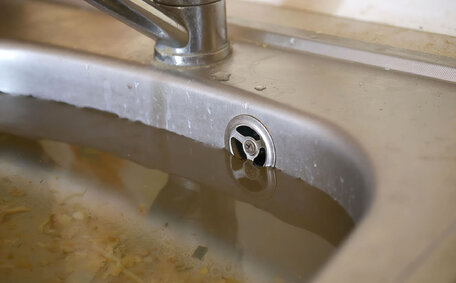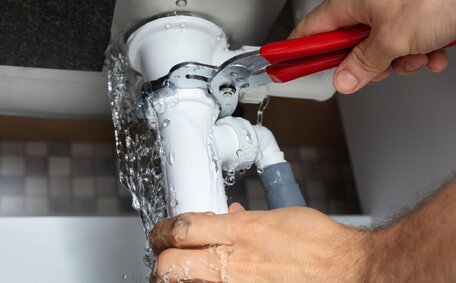What is Pipe Relining and How Does it Solve Plumbing Issues?
Pipe relining, a trenchless technique, repairs damaged pipes by inserting a resin-saturated liner into the existing pipe, creating a new, smooth internal lining.
Pipe relining may be covered by insurance and tackles a range of plumbing issues in both residential and commercial environments, including:
- Blocked drains and your sewer pipes issues due to buildups, root intrusion, cracks, etc.
- Leaking water pipe causing damage to your hot water system, including the water heater
- Deteriorating galvanised or clay pipes prone to breakages that could potentially damage your home
- Reduced water flow and pressure due to mineral deposits and corrosion
While homeowners insurance may cover traditional pipe replacement, pipe relining offers several benefits:
- Minimal digging and landscape disruption, as access to pipes requires only small openings
- Lower costs due to the avoidance of full pipe section replacements
- Reinforces weakened pipes internally to prevent future damages
- Can extend the service life of pipes by over 50 years
- Rapid completion, usually within a few hours, reducing service interruption
Proactive maintenance and timely relining can mitigate extensive damage, frequently averting insurance claims. Determining the specifics of your insurance policy coverage, notably for certain plumbing repairs, is vital.
When Might Home Insurance Cover Pipe Relining?
Home insurance may cover pipe relining under specific circumstances. It’s essential to inquire about the extent of coverage provided for safeguarding your water systems:
- When a cause blocked drain or pipe failure has resulted in water damage or flooding inside the home, some policies will offer compensation. Many policies will provide insurance cover for sewer issues and the cost to identify and fix plumbing leaks as the underlying cause of a plumbing problem. Relining could be included as part of these repairs.
- If tree roots infiltrating and cracking pipes leads to issues, you should check your insurance for coverage on any damage, such as water or sewage backups. This would be considered accidental damage which insurance covers sewer incidents.
- In some cases where pipes have deteriorated over time and then burst, causing water leaks and interior property damage. Some insurers may cover repairs as part of a claim if regular maintenance of pipes can be demonstrated.
To guarantee coverage for blocked drains, it’s prudent to review the specific exclusions, limitations, and conditions within your home insurance policy. It’s crucial to grasp the following:
- Wear and tear issues are often excluded, with insurers commonly rejecting claims due to lack of maintenance.
- Intentional damages caused during renovations might not be covered.
- External pipe repairs are less likely to be covered than interior damage costs in your home.
- Your insurance is more likely to cover sewer line repairs within your property boundaries than those under public land.
Our team recommends you ensure insurance coverage by examining your individual policy or consulting with your insurance company about the details in your situation before undertaking any repairs. Understanding exactly what is covered under your policy can help approve your claim and avoid potential surprises down the track.
Accidental Damage
Accidental damage refers to physical damage that occurs unexpectedly and unintentionally, often leading to insurance claims. Common examples involving plumbing include:
- Burst pipe incidents due to freezing weather or excessive water pressure
- Turn off your water to prevent damage from broken toilet tanks, overflowing sinks/tubs, and detached hoses
- Leaking hot water systems such as burst flexi hose or broken valves
- Clogged drains and sewer backups resulting from foreign objects, roots or line collapses
- Interior water system damage from bad seals around appliances such as dishwashers or washing machines
Sudden plumbing mishaps are typically covered under the accidental loss provisions of standard home insurance policies. Key factors determining house insurance coverage include:
- No one wants damage to be intentional, as a homeowners insurance policy won’t cover deliberate harm - issues from neglect or poor maintenance may also be excluded
- The underlying cause needs to present itself as an abrupt and unexpected event, not an act imposed by nature or an act of god, from the policyholder’s perspective
- Resulting damages such as water soaking into your walls floors, and furnishings are typically covered by your home insurance policies
- External repairs of issues outside your water line often come under property maintenance and might not fall into the dwelling coverage
Speak with your insurer to understand your coverage options related to your sewer line prior to commencing repairs. Quick action is recommended to reduce costs associated with damage.
Tree Root Intrusion
Similar to unwelcome guests, tree roots can infiltrate and clog sewer pipes, inflicting incremental damage. Seeking moisture, they penetrate cracks and joints in older metal or clay sewer lines, which may not be covered by insurance.
Tree root intrusion can lead to blocked drains, backups, leaks, and even collapses in your home, potentially qualifying for insurance coverage if regular inspections and maintenance are documented.
It’s advisable to replace susceptible pipes with plastic alternatives to thwart future root damage. Plastic pipes resist cracking due to their robustly sealed joints, thus preventing root entry. Upgrading to these pipes is recommended to avert disastrous failures that insurance could deny due to neglect.
If tree roots have already damaged your sewer line, pipe relining presents a remedy often eligible for insurance coverage. This non-invasive method strengthens the pipes internally, remedying blockages and restoring flow, and is more likely to be approved for claims compared to full line replacements.
Reasons Insurance May Deny Pipe Relining Claims
There are a few key reasons why insurance companies may deny claims for pipe relining:
Pre-Existing Conditions
Improper Installation
Negligence and Poor Maintenance
Wear and Tear
Regular wear and tear damage is typically not covered by insurance, placing the responsibility for routine maintenance and repair costs of your plumbing system on homeowners.
Discovering wear and tear in pipes, such as corrosion, cracks, leaks, and reduced water flow, can be disconcerting. Insurance claims are often denied if slow deterioration results in pipe failures and subsequent water damage.
Homeowners can reduce the risk of insurance denial by having your own pipe system checked annually and addressing potential problems proactively. Re-piping or relining ageing pipes before they fail can also lend credence to claims if unexpected damage still occurs.
Maintaining adequate records of all plumbing maintenance activities is also beneficial. In the event of a claim, you can provide evidence showing due diligence in system upkeep over time.
Improper Maintenance
Insurers commonly deny coverage due to improper maintenance, which includes neglecting routine pipe inspections, drain cleaning, leak detection, and other preventive measures, regarded as negligence.
Indications of insufficient maintenance can encompass:
- Corroded, damaged or clogged water pipes leading to the need for attentive repairs
- Foul sewage odours and chronic drain blockages could indicate a bigger plumbing issue
- Reduced water flow detected during a meter reading may indicate mineral buildup
- Notable signs water has caused significant leaks, moisture, or flooding
Proper plumbing upkeep, expected by insurers to deter or curtail damage, can influence claim validity. Claims for pipe relining due solely to improper maintenance are generally not covered.
We advise regular annual maintenance and prompt repairs to diminish the risk of insurance denials, and recommend keeping accurate records to contest any rejections. Responsible homeownership involves diligent preventive care.
Navigating Insurance Claims for Pipe Relining
Making an insurance claim for pipe relining can be confusing, but following these steps can help ensure a smooth process:
- Document the Issue - Take photos and videos showing the damage, get written statements from witnesses, save related bills/invoices.
- Get Assessments - Have licenced plumbers assess the problem and provide repair recommendations along with detailed estimates.
- Review Your Policy - Understand exactly what damage your standard policy covers under your specific terms and exclusions.
- File a Claim - Contact your insurance provider as soon as possible after discovering the issue. Submit all documentation.
- Communicate Details - Provide specific details about what happened, the cause, the resulting property damage incurred.
- Consider Upgrades - Discuss supplementing repairs with preventative upgrades like pipe relining which may discourage claim denial.
- Consider Service Line Coverage - Adding this optional endorsement provides more comprehensive protection.
Maintain organization, document thoroughly, and keep your insurer updated with damage evidence while enlisting our plumbing services to streamline claims approval. We support clients at every stage of this process and are available for tailored advice.
Preventative Measures to Avoid Needing Pipe Relining
There are several preventative measures homeowners can take to reduce the likelihood of needing pipe relining down the track:
Conduct Annual Plumbing Inspections
Having a licenced plumber thoroughly inspect your pipes for issues like cracks, leaks and blockages once a year can help catch problems early. Detected issues can then be proactively repaired before causing significant damage, ensuring the job done is both thorough and lasting.
Upgrade Old Pipes
Replacing outdated galvanised steel or clay water pipes with modern PVC options does more than reduce the risk of cracks, breaks and root intrusion over time. Plastic pipes have tighter seals and greater durability.
Clean Drains Regularly
To avoid obstructions that could back up your sewer lines, sinks, tubs and shower drains should be cleared annually by a professional. Specialised hydro jet drain cleaning can clear even persistent clogs.
Install Pipe Filters and Traps
Fitting debris traps and pipe filters or screens into your drainage system in strategic locations helps keep foreign particles from collecting in drains where they can cause eventual backups or damage.
Direct Water Flow Away
Ensuring proper soil and patio grading directs rainwater runoff away from the home’s foundation safeguards the water supply lines helps keep excess moisture from accumulating around pipes underground. This shields the underground pipes around your dwelling from shifts and excess pressure.
Vigilant preventative maintenance minimises pipe damage risks, lessening the likelihood of needing significant repairs such as relining.






